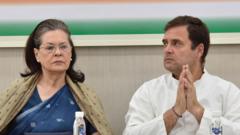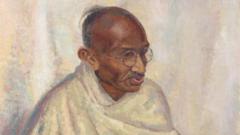Amid allegations of money laundering involving billions of rupees tied to the National Herald newspaper, the Congress party is rallying against what they deem a politically motivated attack by the ruling government.
Gandhi Family Faces Serious Money Laundering Charges as Congress Plans Protests

Gandhi Family Faces Serious Money Laundering Charges as Congress Plans Protests
India’s Congress party is set to protest after Sonia and Rahul Gandhi, along with others, are charged with money laundering.
In a move that has sparked significant outrage, the Indian financial crimes agency, the Enforcement Directorate (ED), has charged prominent Congress leaders Sonia and Rahul Gandhi with laundering substantial amounts of money. The accusations, which also implicate other figures within the party, stem from alleged activities surrounding the acquisition of assets related to the National Herald newspaper, valued at over 20 billion rupees (approximately $233 million). Following the announcement in a Delhi court, the Congress party declared plans to stage nationwide protests.
Congress spokesperson Jairam Ramesh criticized the charges as mere "politics of vendetta and intimidation" from the government. Although the Gandhis have long maintained their innocence, they have yet to comment specifically on the new allegations. The ED's investigation, which began as early as 2021 following a complaint from Subramanian Swamy of the ruling Bharatiya Janata Party (BJP), asserts that the Gandhis misused party funds to assume control of Associated Journals Limited (AJL), the publisher of the now-defunct National Herald.
The Congress party counters these claims by stating it rendered financial assistance to AJL due to its historical significance. They further state that AJL became debt-free in 2010 after converting loans into equity, leading to the establishment of a non-profit entity called Young Indian. This entity is alleged to have procured AJL’s valuable properties for a minimal sum, a transaction the ED has criticized as significantly undervalued.
The agency has initiated moves to seize assets linked to Young Indian worth approximately 6.6 billion rupees across major cities, including Delhi and Mumbai. The hearing for this case is set for April 25th. As tensions rise, political critics have increasingly accused the Modi administration of weaponizing law enforcement against its political adversaries.
A historical touchstone, the National Herald was founded by Jawaharlal Nehru in 1938 amid India's freedom struggle and was known for its connection to nationalist movements. It was relaunched online in 2017 after ceasing print in 2008 due to financial difficulties, marking a consequential chapter in Indian media history. As protests loom and scrutiny deepens, the fate of the Gandhi family and their political legacies remain uncertain in this evolving legal landscape.
Congress spokesperson Jairam Ramesh criticized the charges as mere "politics of vendetta and intimidation" from the government. Although the Gandhis have long maintained their innocence, they have yet to comment specifically on the new allegations. The ED's investigation, which began as early as 2021 following a complaint from Subramanian Swamy of the ruling Bharatiya Janata Party (BJP), asserts that the Gandhis misused party funds to assume control of Associated Journals Limited (AJL), the publisher of the now-defunct National Herald.
The Congress party counters these claims by stating it rendered financial assistance to AJL due to its historical significance. They further state that AJL became debt-free in 2010 after converting loans into equity, leading to the establishment of a non-profit entity called Young Indian. This entity is alleged to have procured AJL’s valuable properties for a minimal sum, a transaction the ED has criticized as significantly undervalued.
The agency has initiated moves to seize assets linked to Young Indian worth approximately 6.6 billion rupees across major cities, including Delhi and Mumbai. The hearing for this case is set for April 25th. As tensions rise, political critics have increasingly accused the Modi administration of weaponizing law enforcement against its political adversaries.
A historical touchstone, the National Herald was founded by Jawaharlal Nehru in 1938 amid India's freedom struggle and was known for its connection to nationalist movements. It was relaunched online in 2017 after ceasing print in 2008 due to financial difficulties, marking a consequential chapter in Indian media history. As protests loom and scrutiny deepens, the fate of the Gandhi family and their political legacies remain uncertain in this evolving legal landscape.
















